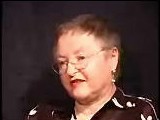You searched for: poland
<< Previous | Displaying results 1541-1550 of 1567 for "poland" | Next >>
-
Axis Powers in World War II
ArticleThe three principal partners in the Axis alliance were Germany, Italy, and Japan. Learn more about the Axis powers in WW2.
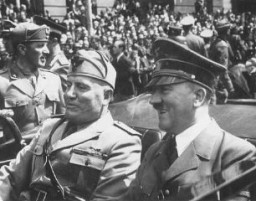
-
Letter from Esther Lurie regarding lost art, 1945
DocumentThis document is one page of a letter from artist Esther Lurie, written after the war, asking for help in following down leads and locating the artwork she had created and hidden while imprisoned in the Kovno ghetto, Lithuania. She wrote, "The matter concerns a collection of 200 pen-and-ink drawings representing scenes of ghetto life which I made during my internment in the Kaunas Ghetto (Lithuania) in 1941-1944. I left the drawings buried in the earth as I felt that I had no hope of survival."
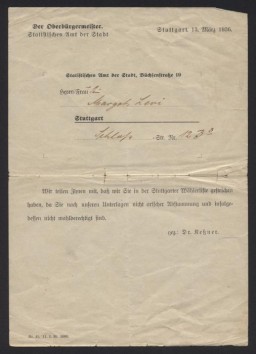
-
Lucine Horn describes her escape from the Majdan Tatarski ghetto
Oral HistoryLucine was born to a Jewish family in Lublin. Her father was a court interpreter and her mother was a dentist. War began with the German invasion of Poland on September 1, 1939. Lucine's home was raided by German forces shortly thereafter. Soon after the German occupation of Lublin, Jews there were forced to wear a compulsory badge identifying them as Jews. A ghetto in Lublin was closed off in January 1942. Lucine survived a series of killing campaigns and deportations from the ghetto during March and…
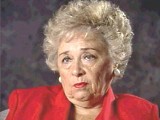
-
Aron (Dereczynski) Derman describes escape from a train during deportation from Grodno in 1943
Oral HistoryAron was born to a middle-class Jewish family in Slonim, a part of Poland between the two world wars. His parents owned a clothing store. After studying in a technical school, Aron worked as a motion-picture projectionist in a small town near Slonim. The Soviet army took over Slonim in September 1939. War broke out between Germany and the Soviet Union in June 1941. Aron returned to Slonim. The Germans soon occupied Slonim, and later forced the Jews into a ghetto. Aron was forced to work in an armaments…
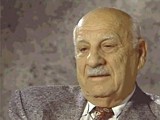
-
Alisa (Lisa) Nussbaum Derman describes her escape from Slonim during a roundup in 1941
Oral HistoryLisa was one of three children born to a religious Jewish family. Following the German occupation of her hometown in 1939, Lisa and her family moved first to Augustow and then to Slonim (in Soviet-occupied eastern Poland). German troops captured Slonim in June 1941, during the invasion of the Soviet Union. The Germans established a ghetto in Slonim in late 1941, following the massacre of thousands of Jews—especially those who could not prove that they worked. Lisa escaped from Slonim and joined the…
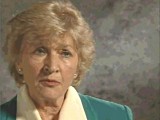
-
Ludmilla Page recalls arriving in Auschwitz instead of Oskar Schindler's munitions factory in Brünnlitz
Oral HistoryLudmilla was born to an assimilated Jewish family in Kishinev, Romania. She and her mother, a physician, were living in Poland when the Germans invaded on September 1, 1939. They were taken to Krakow. Ludmilla was forced to live in the Krakow ghetto; her mother was sent to the Warsaw ghetto. Ludmilla worked in a factory at the Plaszow labor camp for a businessman who was a friend of the German industrialist Oskar Schindler. In October 1944, Schindler attempted to save some Jewish workers by relocating them…
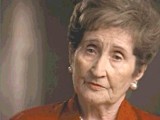
-
Selma (Wijnberg) Engel describes deportation to Sobibor
Oral HistorySelma was the youngest of four children born to Jewish parents. When she was 7, Selma and her family moved to the town of Zwolle where her parents ran a small hotel. When the Germans invaded the Netherlands in 1940, they confiscated the hotel. The family had to live in a poor Jewish section of the town. Selma went into hiding but was betrayed and then sent to the Westerbork camp. In April 1943 she was deported to Sobibor, where she worked in the clothes sorting area. There, the prisoners tried to pocket…
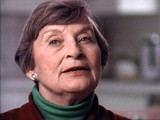
-
William (Bill) Lowenberg describes forced labor in the Kaufering subcamp of the Dachau concentration camp
Oral HistoryAs a boy, Bill attended school in Burgsteinfurt, a German town near the Dutch border. After the Nazis came to power in Germany in January 1933, Bill experienced increasing antisemitism and was once attacked on his way to Hebrew school by a boy who threw a knife at him. In 1936, he and his family left Germany for the Netherlands, where they had relatives and thought they would be safe. However, after Germany invaded the Netherlands in May 1940, antisemitic legislation--including the order to wear the Jewish…
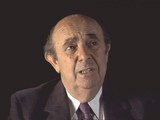
-
Ludmilla Page describes arrival at the Brünnlitz munitions factory
Oral HistoryLudmilla was born to an assimilated Jewish family in Kishinev, Romania. She and her mother, a physician, were living in Poland when the Germans invaded on September 1, 1939. They were taken to Krakow. Ludmilla was forced to live in the Krakow ghetto; her mother was sent to the Warsaw ghetto. Ludmilla worked in a factory at the Plaszow labor camp for a businessman who was a friend of the German industrialist Oskar Schindler. In October 1944, Schindler attempted to save some Jewish workers by relocating them…
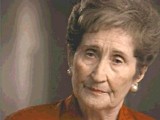
-
Sophie Turner-Zaretsky describes how she began to work through her experience as a hidden child
Oral HistorySophie was born Selma Schwarzwald to parents Daniel and Laura in the industrial city of Lvov, two years before Germany invaded Poland. Daniel was a successful businessman who exported timber and Laura had studied economics. The Germans occupied Lvov in 1941. After her father's disappearance on her fifth birthday in 1941, Sophie and her mother procured false names and papers and moved to a small town called Busko-Zdroj. They became practicing Catholics to hide their identities. Sophie gradually forgot that…
